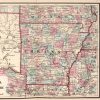calsfoundation@cals.org
Office of Commissioner of State Lands
aka: Office of Land Commissioner
The commissioner of state lands (or land commissioner) is one of seven constitutional officers serving the state of Arkansas. Primarily, the land commissioner oversees the disposition of tax-delinquent property, but the office is also responsible for certain historic preservation initiatives and the leasing of natural resources on state-owned lands.
The office of the commissioner of state lands was created in 1868 by the Arkansas General Assembly as the commissioner of immigration and state lands. This title was given to the commissioner of public works and internal improvements until such time as the offices were separated by the legislature. The constitution of 1874 allowed the Arkansas General Assembly to “provide by law for the establishment of the office of commissioner of state lands,” making this an elected position but noting later that the legislature “at its next session may abolish or continue” the office “in such manner as may be prescribed by law.” The present title of commissioner of state lands was adopted in 1929.
Each year, the state auditor furnishes the commissioner of state lands with a complete list of all lands forfeited to the state for nonpayment of taxes, of which the land commissioner takes control and disposes of as provided by law. The land commissioner is also responsible for “all the books, papers, evidences of title, plats, and maps of all internal improvement, seminary, saline, and swamp and overflowed lands,” as well as making out maps for each township in which such lands are included; the maps are to be kept in the land commissioner’s office for the examination of anyone interested in purchasing state lands. Act 331 of 1939 made it state policy to “protect the lands owned by the State,” and “to provide for their classification and best use in the interests of the future general welfare and agricultural well being of the State,” especially with an eye to creating and preserving forests and parks as well as promoting agricultural settlement upon family-sized tracts of land; this act gave the land commissioner the authority to seek the assistance of the United States and its agencies for purposes of achieving such a goal. The office also oversees the leasing of state-owned lands to private companies for mining or timber purposes; this responsibility was transferred to the land commissioner from the Department of Finance and Administration by Act 509 of 1993.
In 2006, the land commissioner’s office received a $45,000 grant from the Arkansas Natural and Cultural Resources Council to restore and preserve the original journals in its possession that were produced during the original survey of the Louisiana Purchase.
|
NAME |
PARTY |
BEGAN |
ENDED |
|
J. M. Lewis |
— |
1868 |
1872 |
|
— |
1872 |
1874 |
|
|
Democratic |
1874 |
1878 |
|
|
D. W. Lear |
Democratic |
1878 |
1882 |
|
William P. Campbell |
Democratic |
1882 |
1884 |
|
Paul M. Cobbs |
Democratic |
1884 |
1890 |
|
C. B. Meyers |
Democratic |
1890 |
1894 |
|
J. F. Ritchie |
Democratic |
1894 |
1898 |
|
Democratic |
1898 |
1902 |
|
|
F. E. Conway |
Democratic |
1902 |
1906 |
| Lafayette L. Coffman |
Democratic |
1906 |
1910 |
|
Reuben G. Dye |
Democratic |
1910 |
1914 |
|
W. B. Owen |
Democratic |
1914 |
1921 |
|
Herbert R. Wilson |
Democratic |
1921 |
1927 |
|
Democratic |
1927 |
1929 |
|
|
Belva Martin |
Democratic |
1929 |
1933 |
|
George W. Neal |
Democratic |
1933 |
1937 |
|
Otis Page |
Democratic |
1937 |
1943 |
|
Bish Bentley |
(appointed) |
1943 |
1943 |
|
Claude Rankin |
Democratic |
1943 |
1954 |
|
Jimmie “Red” Jones |
(appointed) |
1954 |
1957 |
|
Sam Jones |
Democratic |
1957 |
1981 |
|
Democratic |
1981 |
1985 |
|
|
Democratic |
1985 |
2003 |
|
|
Mark Wilcox |
Democratic |
2003 |
2011 |
|
John Thurston |
Republican |
2011 |
2019 |
|
Tommy Land |
Republican |
2019 |
——— |
For additional information:
Arkansas Commissioner of State Lands. https://cosl.org/ (accessed April 10, 2024).
Historical Report of the Secretary of State—2008. Fayetteville: University of Arkansas Press, 2008.
Staff of the CALS Encyclopedia of Arkansas
 Politics and Government
Politics and Government Public Land Surveys
Public Land Surveys Charlie Daniels
Charlie Daniels  Daniels Campaign Pin
Daniels Campaign Pin  Otis Page
Otis Page  Thurston Campaign Card
Thurston Campaign Card 



Comments
No comments on this entry yet.